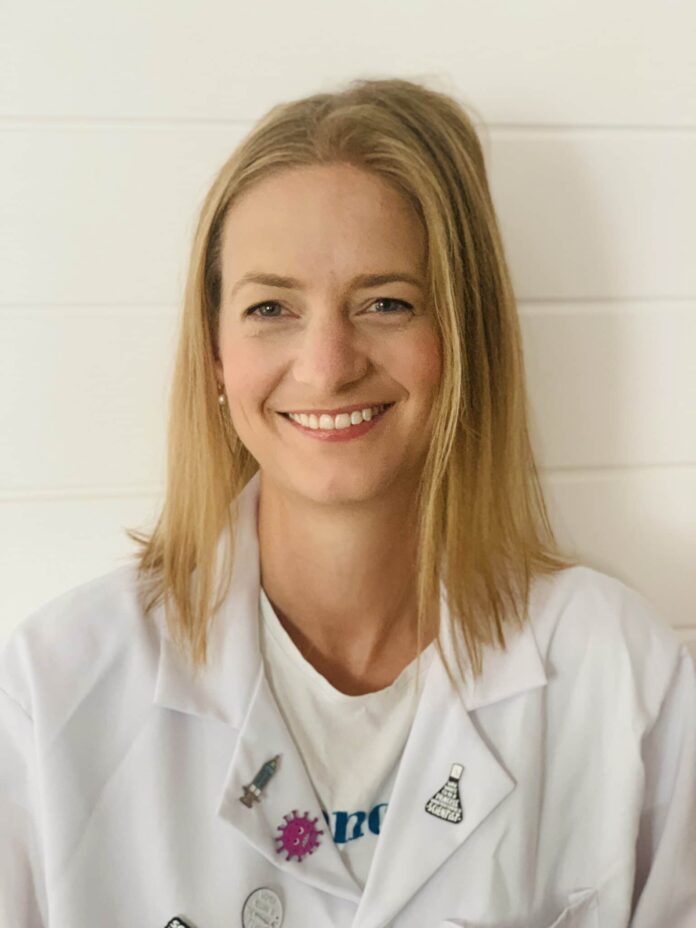A specialist in virology and immunology [1], Dr. Océane Sorel has joined the United Nations’ “Team Halo”, which brings together doctors, scientists, researchers, all volunteers, committed to the fight against misinformation on social media.
Since February 2021, Océane devotes part of her time to popularizing science on her Instagram account “The French Virologist“. There, she explains in simple terms, with certified sources, the scientific facts around COVID-19, vaccines, viruses and immunity in general.
Like Dr. Nathan Peiffer-Smadja, another French member of Team Halo, who is active on Twitter, she will help us better inform you about COVID-19.
This week, she answered questions about COVID pregnancy.
What are the risks for my baby if I catch COVID during my pregnancy?
According to recent studies, contracting COVID-19 during pregnancy increases the risk of fetal distress and premature delivery.
Are pregnant women at greater risk of complications from the coronavirus?
Studies have shown that pregnant women are more likely to develop a severe form of COVID-19 and be hospitalized than non-pregnant women of the same age.
In addition, studies show that pregnant women who contract COVID-19 are at greater risk of developing obstetrical complications during pregnancy associated with a risk of pre-eclampsia, maternal mortality and preterm delivery.
What are the risks for my baby if I get vaccinated during my pregnancy?
Recent studies suggest that vaccination during pregnancy does not cause placental damage, does not increase the risk of miscarriage, and is not associated with complications for the newborn. The data also show that vaccination during pregnancy does not increase the risk of complications during pregnancy or delivery and that vaccines are effective in protecting pregnant women from infection with the virus. Therefore, vaccines given during pregnancy are considered safe for pregnant women and their babies.
When is the best time to get vaccinated during pregnancy?
The Center for Research on Teratogens (Le CRAT) recommendations are as follows on a case-by-case basis:
- In anticipation of pregnancy:
There is no delay between vaccination with mRNA or viral vector vaccine against COVID-19 and the onset of pregnancy.
- Discovery of pregnancy after the 1st injection:
There is no reason why the 2nd injection should not be given according to the recommended vaccination schedule, regardless of the term of the pregnancy, including before 10 weeks of pregnancy.
- Vaccinating a pregnant woman:
Vaccination against COVID-19 is possible during pregnancy, especially in the presence of risk factors.
Based on the available data, as a matter of principle, it is preferred to:
Use an mRNA vaccine.
If possible, start the protocol between 10 and 20 weeks of the absence of menstruation, i.e. after the end of the formation of the embryo’s organs and early enough for the pregnant woman to be protected in the 3rd trimester.
If I get vaccinated during my pregnancy, will my baby be protected against the virus at birth?
Studies show that antibodies are found in the blood of the umbilical cord meaning that there is a transfer of passive immunity from the mother to the baby but the effectiveness and duration of this immunity is still unknown.
Does the messenger RNA also penetrate my baby’s cells?
No, the vast majority of the vaccine’s components remain localized at the injection site and are rapidly degraded by our body after injection. Passage of the placental barrier is therefore not expected and long-term consequences on the baby are therefore very unlikely.
Do I have to give birth by caesarean section if I am positive for the virus?
Recent studies suggest that contracting COVID-19 during pregnancy increases the risk of having a caesarean delivery, however if you have a question about your pregnancy and your health talk to your gynecologist.
Can I breastfeed my baby if I have COVID-19?
WHO recommends that breastfeeding should be continued as much as possible even if the mother is positive for COVID-19, as the presence of the virus has not been detected in breast milk, so transmission of the virus via breast milk is very unlikely.
However, the WHO recommends implementing hygiene measures such as frequent hand washing and wearing a mask to limit the risk of transmission of the virus to the newborn.
[1] Graduated as a Doctor of Veterinary Medicine in 2011, Océane holds a PhD in Virology/Immunology and obtained in 2016 the title of Doctor of Science from the University of Liege.
She then moved to the United States to start a post-doctoral research fellowship at the University of Southern California (USC) in Los Angeles to study human viruses causing cancers. In 2018, she began a second post-doctoral stay, at the University of California, Irvine (UCI) in a laboratory that studies the immune response to viruses such as Ebola and chickenpox/shingles virus.
At the end of 2019, Océane is leaving academic research for private research in California, in the field of gene therapy and viral vectors.
Additional links:
- UNRIC COVID-19 Information Hub
- Center for Research on Teratogens (Le CRAT) Covid 19 Vaccines – Pregnancy and Breastfeeding
- WHO Europe on breastfeeding
- WHO Frequently Asked Questions on Pregnancy, Breastfeeding and COVID 19
- CDC Recommendations

